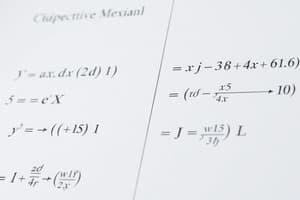Podcast
Questions and Answers
What is the derivative of the function $f(x) = 3x^3$?
What is the derivative of the function $f(x) = 3x^3$?
- $3x^2$
- $x^2$
- $9x^2$ (correct)
- $6x^2$
Which of the following integrals represents the area under the curve of $f(x) = 2x$ from $x = 0$ to $x = 3$?
Which of the following integrals represents the area under the curve of $f(x) = 2x$ from $x = 0$ to $x = 3$?
- $ rac{1}{3}(2x^2) |_{0}^{3}$
- $ rac{1}{2}(2x) |_{0}^{3}$
- $ rac{1}{2}(2x^2) |_{0}^{3}$ (correct)
- $ rac{1}{2}(x^2) |_{0}^{3}$
What is the limit of the function $g(x) =
rac{1}{x}$ as $x$ approaches infinity?
What is the limit of the function $g(x) = rac{1}{x}$ as $x$ approaches infinity?
- -infinity
- 1
- infinity
- 0 (correct)
Which method can be used to determine the concavity of a function?
Which method can be used to determine the concavity of a function?
Which of the following equations shows the Fundamental Theorem of Calculus?
Which of the following equations shows the Fundamental Theorem of Calculus?
Flashcards are hidden until you start studying
Study Notes
Derivatives
- For the function ( f(x) = 3x^3 ), the derivative ( f'(x) ) is calculated using the power rule.
- The power rule states that ( \frac{d}{dx}(x^n) = n \cdot x^{n-1} ).
- Applying this to ( f(x) ):
- ( f'(x) = 3 \cdot 3x^{3-1} = 9x^2 ).
Area Under a Curve
- The area under the curve of the function ( f(x) = 2x ) from ( x = 0 ) to ( x = 3 ) can be found using the definite integral.
- The appropriate integral representation is ( \int_{0}^{3} 2x , dx ).
Limits
- The limit of the function ( g(x) = \frac{1}{x} ) as ( x ) approaches infinity is determined as follows:
- As ( x ) increases, ( \frac{1}{x} ) approaches 0.
- Therefore, ( \lim_{x \to \infty} g(x) = 0 ).
Concavity of a Function
- To determine the concavity of a function, the second derivative test is utilized.
- If the second derivative ( f''(x) ) is positive, the function is concave up; if negative, it is concave down.
Fundamental Theorem of Calculus
- The Fundamental Theorem of Calculus links differentiation with integration.
- It consists of two parts:
- The first part states that if ( f ) is continuous on ([a, b]), then ( F(x) = \int_{a}^{x} f(t) , dt ) is differentiable, and ( F'(x) = f(x) ).
- The second part states that if ( f ) is continuous over ([a, b]), then the definite integral ( \int_{a}^{b} f(x) , dx ) can be computed using any antiderivative of ( f ).
Studying That Suits You
Use AI to generate personalized quizzes and flashcards to suit your learning preferences.




